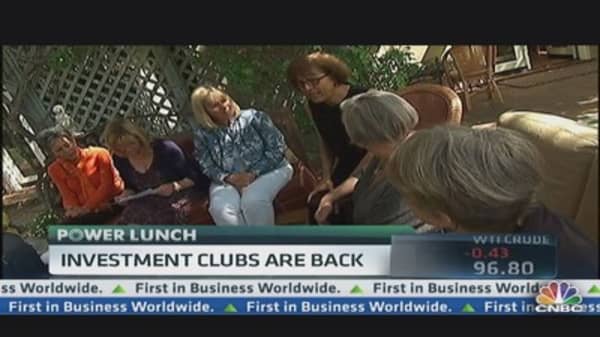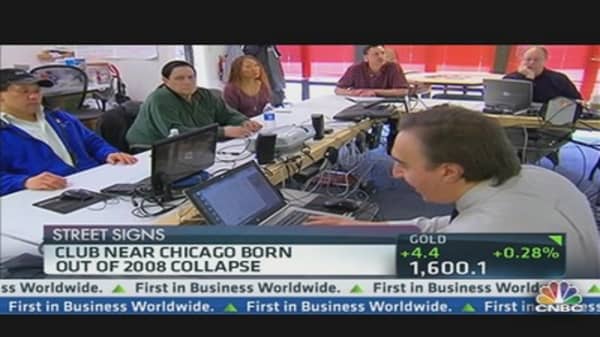His club's "three pillars" are knowledge, discipline and patience, and the group has moved beyond buying and selling stocks to riskier strategies like options and futures.
"It doesn't matter for me whether the market will go up or down," said Mark Kolodizner, who joined the club in November. "I could hedge, I could short, I could long, I could do options, I could do futures. That's the great thing."
(Read More: We're Dumpster Divers': Don Yacktman)
The women in Ojai play it more conservatively. Each had to pay about $10,000 to join the club, which they limit to 20 members. Each month they add $100 apiece to the pot. Over the years they've made money investing in companies like Pfizer, after one member's daughter mentioned a new drug called Viagra. They traveled to Omaha to meet Warren Buffett at the annual Berkshire Hathaway meeting.
"He's just wonderful," said Harriette Erickson, though she admits with a laugh, "I don't know that I got that much out of it."
The club's portfolio ballooned from $70,000 in 2002 to $300,000 in 2006. "When everyone else was making insane amounts of money, we were really doing well, too. We got pretty full of ourselves," said co-president Carol Pillsbury.
(Read More: Why This Means Trouble for Stocks)
That all changed in of 2008. In July of that year, the group bought shares in Lehman Brothers. After the firm collapsed, they met again in October. Serena Carroll remembers one member at the meeting knitting. "She's knitting madly, and we're just looking at the market crash 500 points, everything's crashing ... and all I could think about was Madame Defarge in 'A Tale of Two Cities'. She's knitting madly, and the heads are falling off the guillotine."
After that, the group instituted stop loss orders. "That has protected us in some cases where there's just been a precipitous slide in the stock before we could catch it and act on it," said Anne Kaplan. Like which stock? "Monster comes to mind."
These days the portfolio is worth about $120,000, and the club owns Apple, Alaska Air, Visa, and TripAdvisor. However, with the market hitting new highs, they're in a quandary.
"We're definitely in a transition," said Barbara Hirsch. "There's flux right now."
Barbara Williams agrees. "In the last year or so, we've kind of lost a little bit of our mojo ... I think we're finding our way to a new style of investing."
(Read More: Pro: Time to Short the Market)
Most in the group believe the market is due for a correction. Nick Fosco's group in Chicago agrees.
"The market is extremely overbought right now, it's priced to perfection," said Fosco.
Whatever happens, the clubs of 2012 hope they're better prepared to handle whatever comes next.
"I wish I would have known about this five, ten years ago," said Chicago member George Chan. "It would have saved me a lot of time, a lot of headaches, a lot of frustration."
—By CNBC's Jane Wells; Follow her on Twitter: @janewells





